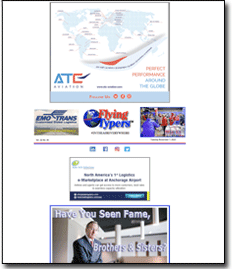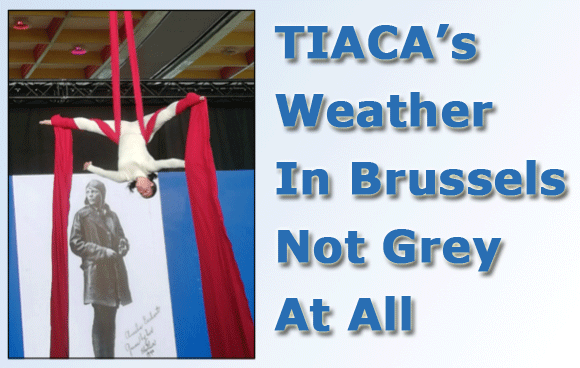 |
Some of us associate the city of Brussels with
the idea of grey skies, bureaucracy and endless negotiations – remember
the jokes about size of cucumbers? My perception, having lived in Brussels
ten years, is that prejudice is much more persistent than reality. As
I said several times, I had a great time in Brussels recently at the FIATA
World Congress and I am even considering coming back for good. No wonder
I was more than happy to return for the TIACA’s Executive Summit,
which truly attracted the who’s who of global Air Cargo to the Belgian
capital.
The International Air Cargo Association
(TIACA) announced “that its Executive Summit was a soaring success,
succeeding in its mission to bring the global air cargo industry together
to discuss, debate and network. The event was held in Brussels, Belgium
and was hosted by Brussels Airport Company” between Nov 6th and
Nov 8th. In their own words, this is what delegates and guest were expecting:
“TIACA is the unique international not-for-profit association representing
and uniting all parts of the air cargo industry: shippers, forwarders,
ground handlers, airports, airlines, manufacturers, IT providers, etc.
TIACA’s vision is a safe, profitable and united air cargo industry
that embraces modern technologies and practices to sustainably and fairly
serve trade and social development worldwide. TIACA’s mission is
to support, lead and unite the industry to achieve that vision; promote
and encourage business, social, and technological innovation; protect
the interests of its members with one voice on common interests; disseminate
and enhance knowledge amongst members and the air cargo industry.”
Precisely on Nov 8th Forum Europe and Euronews
organised their International AI Summit in Brussels. Artificial Intelligence
being on everyone’s mouth in this day and age, the concept was also
often mentioned at TIACA’s Summit, but there was so much more! It
was an intense event: lots of information, concepts, proposals, but also
time to celebrate and meet old friends and make new, interesting connections.
My Linkedin profile exploded, and I did nothing in particular to ignite
such reaction. I wonder whether this happened also to those who participated
in the International AI Summit. Kudos to TIACA for their absolutely immaculate
and captivating arrangement. As Glyn Hughes mentioned during the opening,
he felt indebted to TIACA’s superb team. He was right: you perceived
a seamless line that lead you flawlessly through the conference. Having
organised similar reunions in the past, I know pretty well what that means:
somebody has worked very hard and efficiently behind the scenes. Congratulations:
it was just perfect!
As TIACA puts it: “The event held in the
iconic Skyhall venue at Brussels Airport, brought together over 300 delegates
from across the industry to discuss issues that affect the global air
cargo community. Topics such as trade and business challenges, airports,
regulatory challenges, creating new opportunities, drones, digital innovation,
workforce developments, precious cargo, sustainability and the air cargo
outlook were some of the topics discussed. The Executive Summit is a bi-annual
conference that is designed to address specific issues that impact the
industry on a global level that TIACA can then incorporate into [its]
overall work on behalf of the industry. This year [TIACA] extended further
outreach to university students and next generation leaders to ensure
they too have a say in the industry’s future.”
The conference started with a graceful show
inspired by Amelia Earhart: the athlete-artist literally flew above the
stage with astonishing elegance and lightness, by holding herself on to
a rope made of colourful, sleek textile, with suggestive music playing
in the background. This feeling of levity and confidence was present through
the entire event, despite the number of speakers and moderators who came
to, and went from the very same stage during the debates.
Glyn Hughes introduced the speakers, revealed
the upcoming Hall of Fame celebration and dared mention the lack of gender
balance among the inductees: “please look carefully around you in
the future”, he maintained, implying that there is clearly no shortage
of talent among women.
Steven Polmans, chairman of TIACA, welcomed
the participants mentioning the “paramount importance of logistics”
and recalling that Brussels airport took a principal role in transporting
the vaccines throughout the pandemic. However, the “momentary opportunity
to shine” of air cargo hit the wall as the “momentum has faded.”
There is a strong need for collaboration: digitalisation is imperative
for business: “work closely with your neighbours”, and “sustainability
is paramount, there is no hiding from it.” These were all catchphrases
captured in the very first half hour of meeting. The only way to look
into the future for the industry is to be mindful of these unavoidable
conditions, Polmans concluded, mentioning the 1987 Bundtland Commission’s
definition of sustainability: “meeting the needs of the present
without compromising the ability of future generations to meet their own
needs.” The Chairman continued stating that there is an expected
4% drop in air cargo this year and there is also a growing sentiment against
aviation in general. “There are no solitary solutions to many of
the challenges threatening our industry”, he aptly observed. During
his opening remarks, Steven Polmans also announced that he would go for
a third term as chair, being humbled and grateful for the confidence shown
by the association. The applause following also embraced the outgoing
Vice-chairman, Sanjeev Gadhia.
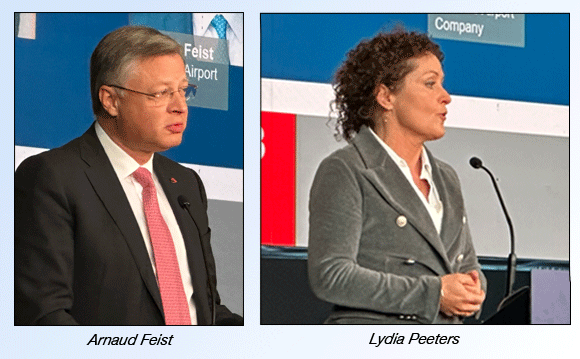 |
Brussels Airport CEO Arnaud Feist then took
the floor for his own welcome on behalf of the airport, which graciously
hosted TIACA’s gathering. COVID vaccines, the importance of sustainability
to ensure the future of air cargo were mentioned again, together with
a thankful note to the neighbouring structure of NATO, which provided
Brussels with sustainable fuels.
The Minster of Mobility Lydia Peeters stresses
the crucial importance of air cargo for logistics in general and Brussels
Airport in particular, pharma and vaccines obviously taking front stage.
The minister also noted that Brussels is the second most important logistics
hub in Flanders, after the port of Antwerp’s conglomerate of activities.
“As Minister my ambition is to send Flanders to number one for sustainable
freight transport,” she said, with a project called VIAVIA, which
is also in line with the declared EU objectives. This concluded the introductory
part, giving all participants a good idea of the main issues on the table.
In this my first article about TIACA’s
event I shall try to cover two other parts of the multifaceted assembly
by mentioning some statements collected at the Industry leaders’
roundtable and the more specific IT and technology-focussed debate, which
has become de facto the main object of interest in the deliberations of
this sector.
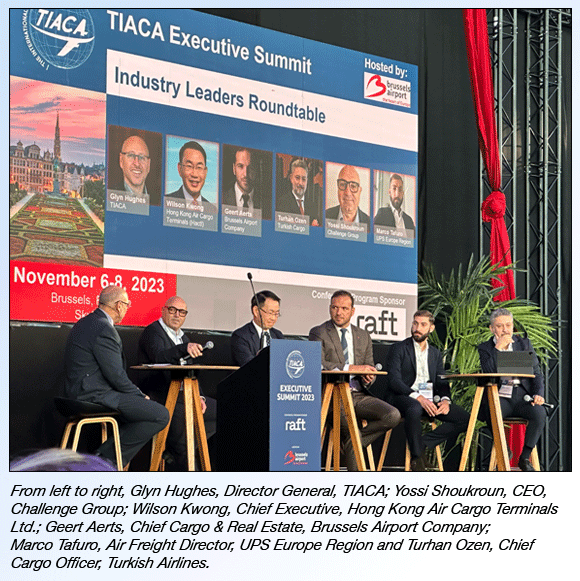 |
In the former one, the panel of industry leaders
discussed the current business environment and the future opportunities
of the air cargo industry and ventured to explore future perspectives
on the last part of 2023 and beyond. A patched picture emerged from the
discussion: customers’ resistance appeared to have remained strong
during the pandemic, considering clients did all not run away in different
directions, but new avenues surfaced on their horizon and this contributed
to building a landscape of increasing uncertainty. Mr. Turhan Ozen, Chief
Cargo Office, Turkish Airlines mentioned the irreplaceable role of air
cargo during the earthquake in Turkey: the huge area affected could receive
supplies by air only for a long period. Glyn Hughes observed that certain
elements are constant in different geopolitical areas, save in case of
emergency, when the urgency prevails on any other economic evaluation.
Looking from inside the business, it was asked whether the attention to
customers’ needs is sufficient in the industry; on another tone
which arrangements could appear stronger to attract the younger generation
to the industry, as this remains a challenging mission for everybody.
Opening the discussion to the audience, the idea of combining sea freight
and airfreight surfaced as a possible solution suited to meet customers’
evolving requirements.
Regarding 2024, the outlook was not described
as bright, but it was noted by Turkish that air cargo would be the first
sector to start bouncing back, probably as early as the end of 2023. Mr.
Marco Tafuro of UPS also elaborated on healthcare logistics, as well with
many others in the room. This was surely the one item that emerged to
be the real stronghold of Brussels Airport, also thanks to the sizeable
investments that had been made. The Head of Cargo at Brussels airport,
Geert Aerts, stylistically asked himself: “What sets us apart from
the rest?” Investing in specialisation appeared as the key factor
in his reply: reliability in live animals, perishables, pharma, innovative
fuels, etc. these investments were noted as parts of the winning recipe.
Aerts also noted that: “As a leading organisation within the Stargate
EU Green Deal initiative, Brussels Airport has recently successfully completed
its BlueSky assessment. With this first TIACA BlueSky community program,
Brussels Airport continues to pioneer, in collaboration with our tightly
knit Brucargo community, towards a more sustainable cargo Industry.”
As it was mentioned at this point for the
first time, we might as well spend a couple of words about the Blue Sky
Initiative and its community, which was launched also with the cooperation
of Air Cargo Belgium. Best to resort to TIACA’s own words to describe
the successful initiative: “The International Air Cargo Association
(TIACA), Air Cargo Belgium and Brussels Airport formally announced the
first TIACA BlueSky community program. The TIACA BlueSky program, launched
in 2022, is the air cargo and logistics industry’s only program
designed to provide individual companies with a verified independent assessment
of their sustainability credentials. Air Cargo Belgium and Brussels Airport
Company have established a sponsorship fund which will support 15 members
with their BlueSky assessment by co-sharing their fees into the globally
first TIACA BlueSky community program. Not only will this deliver the
individual assessment to the members, more importantly this initiative
will also provide a community report outlining Air Cargo Belgium’s
shared sustainability objectives.”
The second part of the debate focussed principally
on the evolution of e-commerce. It was observed that we are moving from
a pre-Covid situation and greater importance is now assigned to hubs,
e.g. looking at what happens in Liège. Production is moving away
from China, whilst China is a becoming rapidly a new, big consumer. Mr.
Tafuro noted that the USA is running at full speed and UPS is expecting
to ramp up its staff in view of the upcoming congested weeks before the
winter holidays, but in Europe he said staff was probably sufficient to
meet the needs of the peak season after "brown Friday". Some
speakers concurred on the expectation that the 2nd part of 2024 was to
be seen as positive; Mr. Tafuro agreed in parts, but Geert Aerts was admittedly
less optimistic... “At best it will be more or less the same, he
said, save the USA will probably grow faster.”
Let me now take a big leap into the afternoon’s
session on digital innovation. I expect some could criticise this totally
unorthodox way of reading the TIACA discussions, but in my understanding
most of the meat on the table was about two adjectives: Digital and Sustainable,
and how these two instances combined could influence the development of
the sector in the near future.
So I might as well give you the other section
here, even though this is not the order chosen by the organisers. The
panel on digital innovation was announced on the programme with these
words: “Innovation is the lifeblood of any industry and with increasing
customer expectations coupled with a more complex operating environment
the air cargo industry needs to embrace and accelerate digital solutions.”
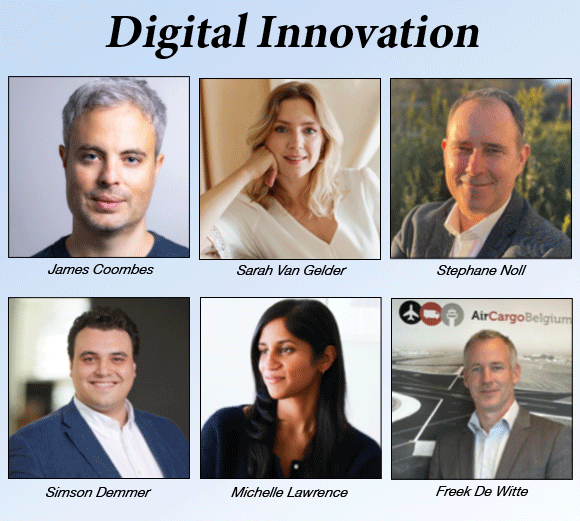 |
No doubt on the competency of the participants,
this was a complex panel where there was no one-size-fits-all feeling
and the debate was conducted on a thin line, suggesting strong interests
exist in this area. It all started with relatively difficult questions:
is it ethical for data to be provided to software and digital entities?
Does a software company provide added value, is this approach just monetising
data? Who is actually profiting of the data?
It was observed that nobody works for free
and data is the new “oil & gas”, with the additional benefit
that with regard to data the more you share it, the richer it gets . .
. On another tone, individual data is overestimated whilst aggregate data
is underestimated. It was also observed that there is a huge responsibility
on aggregated data. Some observed that there is a need of strict governance
and the anonymization of data is imperative. It was also registered that
self-governing policies do not always work, despite many voices in the
sector faring in that direction. There is an issue in the nature of data,
and the issue is similar to Facebook’s with private persons’
data. Data is anyway shared today, said Stéphane Noll, as it was
exposed during the Air Cargo outlook given by WorldACD, which presented
route prices, or Xeneta which showed data on volumes during the Ocean
and Air session.
It was also observed that there must be
an incentive for data to be provided and the right to get the data should
be earned one way or another and not taken for granted. In the debate
with participants from the audience it emerged that value added is what
is required as an industry, so data ownership can represent an aspect
of added value. New technology, including AI, requires adaptation and
incentives, it takes a few years for the industry to adopt new technology,
but there is an interest to actually get new technology adopted and in
place soon, as services can be improved through new technology. New skillsets
and a completely new human interaction are to be expected, but on the
other hand critical thinking is not achieved yet by any machine learning
equipment. In other words, completely replacing people in current jobs
is not going to happen, trust relations are emotional and that human connection
cannot be reproduced by a machine, at least this is what seemed to emerge
from the discussion.
Competition and cooperation function in
a more complex manner today than in the past . . . for example, airports
are both cooperating and competing with one another, depending on their
geography. There are still siloes that are difficult to cross, to achieve
better collaboration. Again the debate with the audience suggested that
there still is an issue with the nature of data to be collected: lots
of data is still on paper and this is a major obstacle to progress, the
issue of competing standards in the data collection and transmission still
exists, the one and only standard for everybody remains a dream . . .
The Brucargo community was acclaimed as being a really surprising and
positive experience. Sarah van Gelder, director of products at Nallian,
observed that each stakeholder has its own degree of digital maturity,
which is an important element to factor in. Another question came to the
panel underlining the importance of the human factor; the discussion then
overflowed onto the issue of demographics and digital competency. “I
don’t think it is a question of age” was strongly observed
by another panellist at the end.
What we can make of this debate? The first
thing coming to mind is that TIACA offers a relaxed, far reaching platform
for professionals to discuss their concerns with little or no limitation,
the climate of the discussion was rich in lights and shadows, surely in
line with the changing weather of Brussels, which gave us – in just
two and half days – the full list of phenomena, with the only exception
of frost and snow, really too early for the season.
Sitting at the delegates’ tables,
there surely was no way to get bored or drowsy. Perhaps too involved at
certain points, but definitely engaged, the audience followed the complex
debate with complete attention. It must be noted this was a discussion
for informed professionals indeed: if you had nothing to do with air cargo
or logistics in general you would probably only just follow the progress
of the deliberations. TIACA is indeed an association for expert members
and that was clear each step of the way.
This being said, it was not just work and
debate: networking was, as is tradition in TIACA, a very important part
of the attraction. I promise I would give you more on this point in the
next numbers and tell you more about the evening, which was very pleasant.
We took airport buses provided by our hosts to reach the St. Gery’s
Hall, i.e. the place in the centre of Brussels, where we were tempted
by the great Belgian food on display, to be savoured with a selection
of beverages, amongst which Belgian beer was of course l’invitée
d’honneur.
Marco L. Sorgetti
|




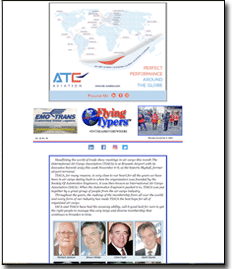 Vol.
22 No. 39
Vol.
22 No. 39